Ed Ward tribute
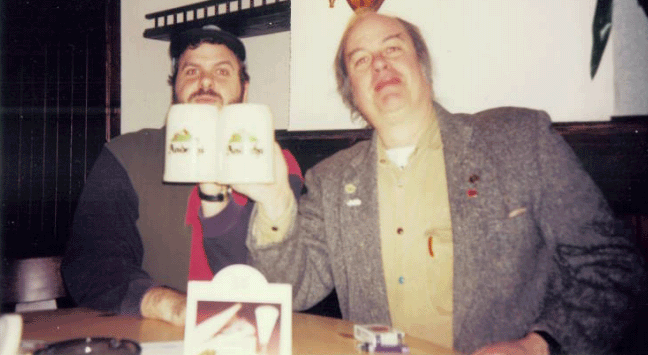
Me and Ed toasting, Berlin, November 1998
Ballad of A Restless, Aggrieved, Devil-May-Care Polymath
by Jason Gross
(June 2021)
For years, I had been obsessive about this bizarre, obscure folk/jazz/rock band from the late '60's that called itself the Insect Trust and it seemed to me that there was one writer who held the key to who and what they were- Paul Gambaccini's 1979 collection Rock Critics' Choice: The Top 200 Albums had a writer named Ward who sported a cowboy hat and wide-mouthed smile and listed their second/final album in his top 10 albums of all-time. I also recognized Ed Ward's name from another book from that same year that also surveyed rock critics- Greil Marcus' Stranded, where Ward beautifully wove fact and fiction about doo-wop legends the "5" Royales- thanks to that essay, I splurged on an original copy of the that album (Dedicated to You), which I have hanging and framed over my bed. A native New Yorker who spent years in California and Austin, by the late 90's, Ward was calling Berlin his home and that's where I found him when I wanted to chronicle the story of the Trust. When I first contacted him in February 1997 and asked him about the band, here's what he had to say:
"Not only was I a big fan of the Insect Trust, I may be one of the few people not in the band to have seen them play several times. Furthermore, one of those occasions was at a (disastrous) show I promoted while in college. I also visited them at their luxurious apartment/squat in Hoboken (definition of luxurious: "We're one of the few buildings on the block the junkies haven't stripped the copper wiring out of."), and, while an editor at Rolling Stone, took pity on their poor clarinetist and gave him a couple of record review assignments when he then parlayed into a career with Rolling Stone, the New York Times, Oxford University Press, and academia. Ah, well, at least Bob [Palmer] gives me credit for it. "Though he was pressed for finding paying writing gigs (a similar problem he faced for the rest of his life), he was impressed enough with my zine to help with the series: "Hey, man, anyone who runs a *three-part* interview with Peter Stampfel is okay in my book." He would help me get in touch with the band and I was about to crank out a series of articles/interviews about them about a year later. Sadly, that didn't include his old friend/colleague Mr. Palmer, who died just before I tried to get in contact with him. I was enamored of Palmer's work, not the least because he could easily cover everything from the Delta blues to electronic music. Turns out, Ed had the same quality and ability himself.
While we were corresponding about the Trust, Ed mentioned this music festival that he was involved in. "I've only been back from the States (went to SXSW, which you asked me about: South By Southwest Music & Media Conference in Austin, which I've been associated with since the start; lots of fun, 700+ performers, etc. etc.) for a couple of weeks, and had lots of stuff to do here once I got back." I'd file that information mentally but I would come back to it and have it became a major part of life.
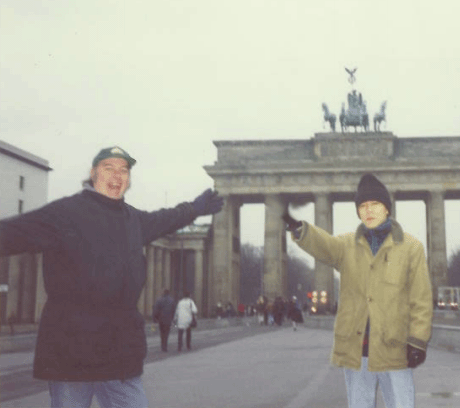
Ward and friend at the Brandenburg Gate, 1998
Before then though, my pals and I were planning a trip to Germany and made arrangements to meet up with Ed (who lived in the Mitte section of Berlin) in late November 1998, which turned out to be a great idea. As several other writers here note about Ed, he was the best tour guide you could ask for in that city. As an incredible gormandizer, he was able to pick out a bistro that would serve us a platter with pork made four different ways accompanied by beer steins that were larger than our arms. Walking through the city, he would point out buildings that still had bullet holes from the Soviet invasion during WWII. As the techno scene was thriving there, he tipped us off to several clubs where we could hear the best of the music, including Tresor and Liquid Sky. He also introduced us to the owners of a local techno label (Kitty You) and tipped us off to a remarkable music festival going on right there and then: the two-day Ballroom International mini-festival at happening at the massive Volksbuehne, which held several stages of music, including Muslimgauze (his last live performance), Ryoji Ikeda, To Rococo Rot and Tarwater. When we took a side trip to meet and visit Holger Czukay at his home studio, it was a remarkable experience but Ward's tour was definitely on par with it. During the trip, Ed liked to refer to himself as 'Herr Ward' as if to ingratiate himself with his surroundings, and that's how I thought of him and referred to him from then on.
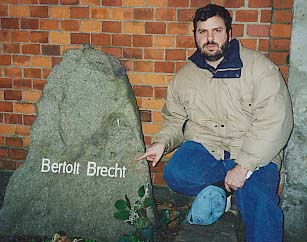 |
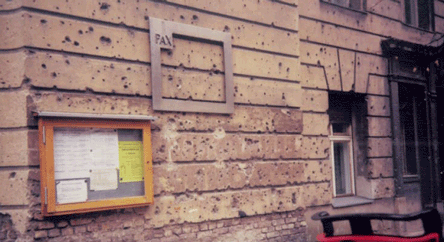 |
| Me at Dorotheenstadt Cemetery; Russian WWII bullet 'decoration' of German archiecture, November 1998 | |
Around that time, I took his advice and got onto a panel at SXSW and planned to make my first trip to Austin and the fest in March 1999, where I'd meet up with him again (curiously that year, when then Texas governor George W. Bush looked to be a presidential candidate, Ed was dismissive of the idea of him actually getting to the White House ). I had an ignorant snobbish Northeastern take on Texas, wondering why the hell I was actually going there- that would soon change. SX was nothing on the scale of what it later became but I was so overwhelmed by the city, the people, the food, the beautiful weather, the supportive music scene and the clubs all lined up around Sixth Street that I actually told him that I was thinking of moving there, which he encouraged me to do. I didn't move there but I wound up going back to the festival every year since then, working as a panelist, moderator, panel organizer and, for the last several years, a moderator-trainer, not to mention the times that I wrote about the music and panels for several publications including Billboard and the Wire. Since Ed was a co-founder of the festival (which he said was originally an excuse to try to keep the college kids in town during spring break), he always got a 'Platinum' all-access pass and would return each year, organizing a pre-festival breakfast get-together for friends and writers. Usually, I couldn't make it out to these but he always made it a point to invite me.
Ed would also stick around for the post-SX ballgame that the festival folks would use to unwind. The regular announcer was none other than local legend Doug Sahm (aka Sir Douglas), who would also start things off with a singalong of "Take Me Out to the Ballgame." I watched Ed literally chase Doug around one year for an interview, not knowing about their previous mixed history. When Ed finally wore him down, he introduced me to Doug and tried to ask him questions. Doug got annoyed and said "I don't wanna keep talking about my past. I wanna think about what my future." Ed relented and asked him what he was planning. Without missing a beat, the old stoner blurted out with a laugh, "Hell, I don't know what I'm gonna do!" which left Ed rolling his eyes and burying his face in his hands.
Over the next 20 years, Ed and I stayed in touch pretty regularly. At the time I met him, Ed was in his 50's and not particularly concerned with looking hip, which I had huge respect for, as I try to find off that impulse myself now. He was tall and bald with a big belly and a thing for button-down shirts and glasses that dangled on his chest from a chain around his neck. Just moments apart, he could be very cynical and very funny, letting out a full throttled chuckle. Like me, he was overweight but he had enough sense to have some concern about that, once telling me before a dinner get-together, "(the) problem is starch, though: diabetes can only be controlled by some strict discipline. Thus, I could probably eat at the Indian place but no rice, which seems to send my numbers skyward." He'd always complain about editors he worked with and their lack of support, which always made me wonder how he'd make ends meet though he himself always seemed casual about his precarious situation.
Needless to say, he was also a great source about music. I would keep picking up compilations of classic old material from Mississippi John Hurt, Skip James, Dan Hicks, John Fahey and others and be pleasantly surprised to see that Ed has supplied the liner notes but giving his vast knowledge, that shouldn't have been too surprising (see some of his credits at AllMusic). Among other things, he recommended to me Lloyd Bradley's Bass Culture as a primo source on reggae history (which it is), and schooled me about Northern Soul (which I later became a big fan of). Not long after we first met up in the mid-90's, he was also curious about what the big deal was about Radiohead, which I tried to convey. Even after all of his talk about music, musicians, the scenes, the heroes and villains of the industry, one of my favorite long-perspective quotes from him was "there's more to live than music," which he truly believed, and lived as someone who was conversant about, and immersed in, travel, history and food.
Ed was also a great source for stories, many of which he recounted from firsthand experience. Here's some of the most memorable ones:
- In the early '80's, he met Big Joe Turner and told him, "it's an honor to meet you." "It certainly is!" Turner answered as he hobbled along past him on crutches.
- He found out that John Lee Hooker was staying in the same hotel and got the courage to find out which room he was in and knocked on the door. Hooker answered the door completely naked. Ed told him what a fan he was and Hook casually said, "Well, that's very kind of you." He then slightly opened the door to reveal two gorgeous naked blonde women lying on his bed. "But as you can see..." Hook continued, "I'm a little busy so I'll just say good day to you" as he closed the door.
- Ed went to Jamaica in the '70's to interview (among others) Big Youth and waited for him at hotel pool. Youth roared up on a motorcycle with his posse to meet him. Ed also got heat stroke during the trip without realizing it, having a young kid help save him.
- In the Creem days (presumably early '70's), Dave Marsh was arguing with Lester Bangs about Black Sabbath, insisting that they were just the Yardbirds played at a slower speed. This turned into a vicious wrestling match with Bangs getting the advantage and at one point yelling at Marsh, "stop struggling, I'm only gonna hurt you!" Ed had to separate them. I later asked Marsh about this and he confirmed it though he added that afterwards, Bangs was forced to concede the point when Marsh did actually play the Yarbirds for him slower.
- In the 80's, he took a Brit friend to see industrial/noise combo Test Department live and after the raucous show, the band were hanging in a large plastic bags from the ceiling, almost blocking their way out. "I need a drink!" his friend exclaimed.
- Ed inadvertently set up a live rendezvous with Bobby Blue Bland and Iggy Pop. He told me this incredible story himself but later wrote it up in much better detail than I could supply in this this Austin Chronicle article (see the last few paragraphs).
- During a low period for Marvin Gaye in the late '70's as he was dealing with a messy divorce, Ed was interviewing him for a story and part of it was racing around after him in a car. Later when they finished, Gaye said to him that he actually had a lot more to say that wasn't really official record company stuff. Sad to say, that additional conversation never happened.
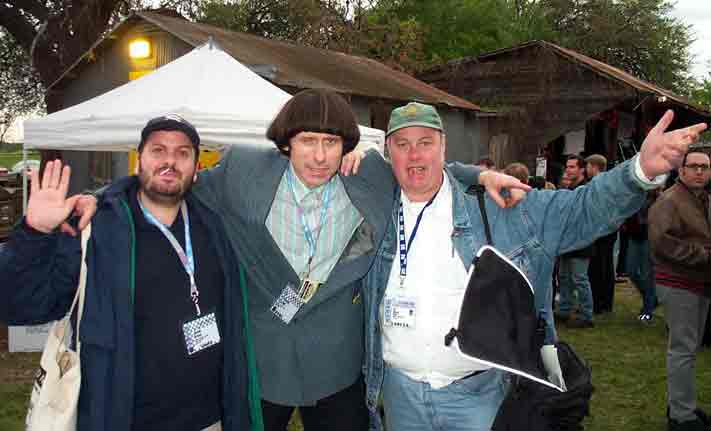
SXSW 2001: Me, Beatle Bob, Ed
But Ed also had his cadre of writer chums, many of whom he would gather for those storied pre-SXSW meals. I'd miss those but I would see him at the festival itself many times and learned the hard way that if I had an evening show to catch, it was best to get him to go to an early dinner and lie about the set time so I could make it there to see the acts. The upside was always that he knew the best places to eat in town and would introduce me to other writers, some of whom became longtime friends of my own, like his old Creem running buddy John Morthland, L.A. TV host Art Fein and scenster 'Beatle' Bob. At one of my first SXSW trips, we saw Terry Allen perform "Gimme a Ride to Heaven" with David Byrne as Ed and I watched and sang along. At a 2007 Stax Records showcase, when one of the performers called out for the audience to do a soul clap (a steady, fast beat), Ed was the only I saw there who could do it right. At a a keynote interview with Lou Reed, an audience member was stupid enough to ask about his old rival Lester Bangs, which immediately set Lou off- Ed sat next to me in the crowd and said out loud, "he's dead Lou, get over it..." At a SXSW panel, Link Wray's classic instrumental "Rumble" was played over the speakers, and during the Q&A, Ed (standing at the back of the room) pointed out that the version they played wasn't the original that he knew and loved- the original, he insisted, had a big, blaring, ugly guitar sound blasting out those indelible chords, which he promptly mimicked and demonstrated with some air guitar that even Wray would have appreciated. After I got familiar with the panel process at the fest, I also arranged a 2012 panel on modern classical music which I got him on, along with composer Carl Stone and the New Yorker's Alex Ross.
Similarly, when he was able to swoop into New York, we'd meet also meet up, almost always for superior dining experiences (he did advise me, "I won't eat Turkish food, though. Lived in Berlin too long"). In 2009, he arranged for a dinner get-together near my day job (out of deference to me) which included guitarist Gary Lucas among others. About ten years later, we met up at my favorite Manhattan Indian restaurant near me (Dhaba) and he shared his Gotham schedule otherwise: "I really have no plans, although I'll hit the Met and the Gugg. Fairly dull up here, but it's nice to be out of Austin." While others we'd taken to the restaurant loved the place, Ed, being the hardcore food connoisseur, liked it but didn't get bowled over. My girlfriend shared a sitcom idea with him about a group of dysfunctional writers at a music magazine, styled after Creem or early Rolling Stone and wanted to know if he'd watch something like that- his take on it was "no thanks!" as if to say that he'd already lived through that.
The next few times we saw him stood out for a few reasons, not the least because it would be the last few times we'd ever see him. To me, he seemed like kind of a rootless wanderer, going from Austin to Germany to France back to Austin, but who also seemed to be at home wherever he chose. By the end of the 2010's, he felt jaded about SXSW as it, like Austin, was growing out of proportion. Even when he was at the convention center, walking past a show going on a few feet away, he insisted that he just didn't go to live shows anymore. I wondered if it was the noise factor and it seemed more than he had just tired of it by then. For SXSW 2019, Scott Crawford was ready to premiere his Creem documentary, which Ed appeared in. That year, we stayed with Chuck Eddy, my old editor from Village Voice (and another Creem alum in the film) and illustrator Lalena Fisher and decided to have a get-together with Ed and Scott, plus Jaan Uhelszki (another Creem alum and the writer of the film), Stephen Thomas Erlewine (who I knew from All Music Guide) and publicist Randy Haecker. Ed of course picked the place that we all wound up eating at (Taquerias Arandinas).
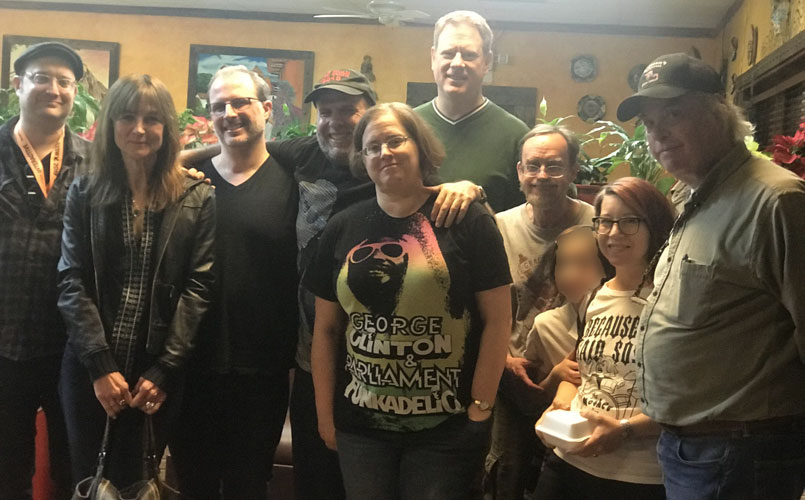
Austin, March 2019: Scott Crawford, Jaan Uhelszki, Stephen Thomas Erlewine, Jason Gross, Robin Cook, Randy Haecker, Chuck Eddy, (a ghost), Lalena Fisher, Ed Ward
In March 2020, with the pandemic about to become a reality in the States, SXSW was cancelled at the last minute. We decided to go to Austin regardless to see the area and spend the first few days at Ed's place. He lived in South Austin in a spartan one story house with a bedroom that had a mattress on the floor, a living room lined with shelves and shelves of albums, CDs and box sets, a sunken couch that we slept on, plus another smaller room in the back that was an office workspace with papers and albums scattered around. What was impressive though was the large kitchen area where he no doubt concocted some elaborate dishes, though nothing I could remember when we were there. He did mention that he had been having (pre-COVID) issues for a while with his sense of taste and/or smell disappearing and was relying on a doctor he knew in France to help him with it.
Going through all of my photos for the Texas trip, where we traveled to San Antonio and the German hill country as I chronicled how the area was dealing this this new reality, I couldn't find one single photo I took of Ed or his place, which was incredibly stupid and shortsighted. Looking back, my only excuse might have been that by then, we saw Ed as this ubiquitous presence in Austin that we would always see there for SXSW.
(Several weeks after he died, when an estate sale was organized of Ed's belongings, I noticed several items there that stood out from our visit to his place: an unusual stereo with see-through components, an odd painting of a pill-popping Elvis and a mid-60s concert poster with the Charlatans and Big Brother and the Holding Company)
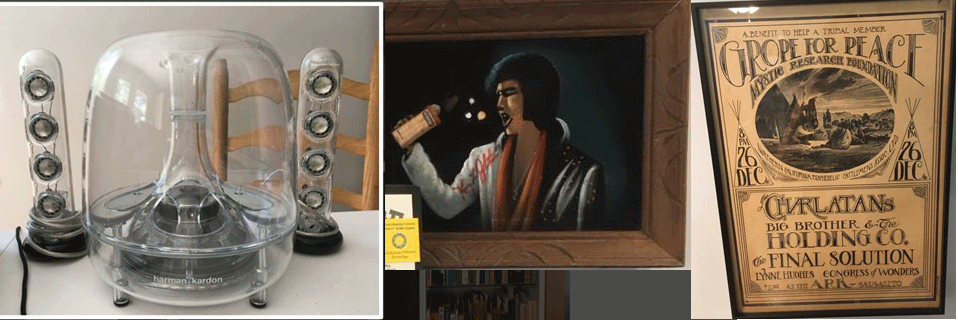
Needless to say though, for that last time we saw him, he hipped us to more dining destinations that we loved and that we didn't know about otherwise, including breakfast at Habanero and dinner at Loro. Another stop was a great bookstore called BookPeople. There, he showed me an amazing book about modern-day Austin and the music and arts scene there- Joe Nick Patoski's Austin to ATX. There at the shop, he also saw a copy of the 2019 bio of guitarist Mike Bloomfield, which unfortunately overshadowed his own Bloomfield book which came out in '83 and was reprinted in 2016 (with an intro by ZZ Top's Billy Gibbons). As Ed pawed through the other bio, he sighed at all the factual errors he spotted.
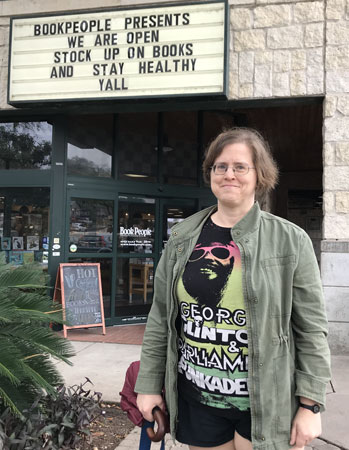
Robin Cook at BookPeople, Austin, March 2020, repping P-Funk once again
After our 2020 Texas trip, we still connected online. After the Holy Modal Rounders' Steve Weber died that year, I interviewed Ed for a series of articles I did about Weber and he was also kind enough to put me in touch with several other people who knew the Rounders guitarist too. When the Texas power/water outages happened this past February, I contacted a bunch of Austin friends to share resources I found online to help them. Ed's response was probably the last correspondence that I go from him: "I have money, so I don't need free food, but getting it delivered is a problem. I just went down to the food trailer park down S. 1st and nobody was open but the pet treat store. Problem is, like me, nobody has water."
I first saw heard about Ed's death from the newsletter from Paste magazine, which carried a tribute story that began with details of him being found days later, lying on his floor. During COVID times, it wasn't unusual to not have people over to your home regularly but it was still heartbreaking to hear that's what happened to him. When you hear that an old friend is gone, you feel like you've lost a part of your own life. I knew that I would be back in Austin and SXSW but there was no way that it could be the same for me there without Ed, though I knew that he would still be there in other ways. After I lost other music-world friends (Ari Up, Holger Czuaky, Robert Quine), I dealt with the grief by writing about them and knew that I would have to do the same with Ed. After writing out all these details and stories, It does feel good to share it all but there's still some emptiness and loss that I can't shake off.
I never spoke with him about it when I last saw him in 2020 but it did occur to him that he lived alone and he didn't seem that close to any of his neighbors on his block. Even if I had brought up the idea that maybe he needed some kind of medical alert bracelet, knowing Ed, his reaction would have likely to have been to shrug it off with a laugh and say "just toss me in a hole in the backyard and give my stuff to U of T."
Out of curiosity, I looked through several online sources to try to nail down where exactly Ed last lived in Austin. The area was generally called "South Austin," which the Hoopmaps website notes as "fighting off gentrification...losing." The huge area had many neighborhoods, with colorful names like Mueller Acres, Meadowcreek, Hillside Oaks, Buckingham Ridge, Emerald Forest and South Slaughter, but none of those were his area per se. It seemed that Ed lived in a place that had no precise name. That seemed entirely appropriate for a unique character like him.